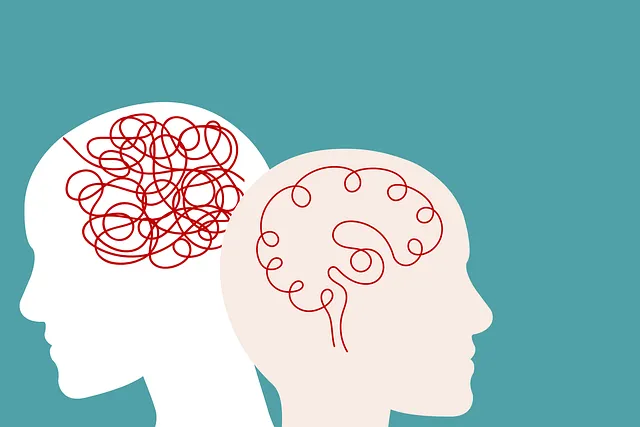Media portrayals of mental illness significantly shape public opinion, often through stereotypes that contribute to stigma. The Kaiser Permanente behavioral health center Superior offers comprehensive services to counteract this by promoting accurate representation and reducing stigma. Through education, evidence-based practices like stress management workshops, and their Mental Wellness Podcast Series, they empower individuals to take control of their mental well-being. By challenging media stereotypes, the center fosters understanding and support for people living with mental health issues, contributing to a more empathetic societal landscape. Media literacy is key in combating negative perceptions, enabling individuals to identify and challenge stereotypes. Positive representations in media, like successful case studies in television and films, raise awareness and encourage discussions about better support systems, such as those offered by Kaiser Permanente behavioral health center Superior.
In today’s media landscape, the representation of mental illness plays a pivotal role in shaping public perception. This article delves into the significant impact of media portrayals on mental health attitudes, highlighting the crucial efforts of organizations like the Kaiser Permanente Behavioral Health Center to promote accurate and nuanced depictions. We explore common challenges, including stereotypes and misconceptions, and present effective strategies for enhancing media literacy. Additionally, successful case studies demonstrate how positive narratives can drive public awareness and foster a more understanding society.
- Understanding the Impact of Media Portrayals on Mental Health Perception
- The Role of Kaiser Permanente Behavioral Health Center in Promoting Accurate Representation
- Identifying Challenges: Stereotypes and Misconceptions in Media Depictions
- Strategies for Enhancing Media Literacy and Encouraging Positive Mental Health Narratives
- Case Studies: Successful Representations and Their Impact on Public Awareness
Understanding the Impact of Media Portrayals on Mental Health Perception

Media portrayals of mental illness play a significant role in shaping public perceptions and understanding. The way mental health conditions are depicted in films, television shows, and news media can influence how society views those struggling with these issues. Often, media representations fall into stereotypes or exaggerated narratives, which may inadvertently contribute to stigma and misinformed attitudes. For instance, showcasing severe psychosis without context might create a fear of the unknown, while romanticizing certain conditions could deter individuals from seeking help.
At the Kaiser Permanente behavioral health center, we recognize the power of these portrayals. That’s why our Superior trauma support services are designed to offer comprehensive care and educate both patients and the community about mental illness. By promoting accurate representation, we aim to foster empathy and reduce stigma. Through evidence-based practices and programs like stress management workshops and Mind Over Matter principles, we empower individuals to take control of their mental well-being, ensuring they receive the support they need without the added burden of negative societal perceptions.
The Role of Kaiser Permanente Behavioral Health Center in Promoting Accurate Representation

The Kaiser Permanente Behavioral Health Center plays a pivotal role in promoting accurate representation and understanding of mental illness within media. By utilizing its expertise in behavioral health, the center produces high-quality content that showcases the complexities of various mental health conditions, challenging stereotypes often perpetuated by mainstream media. They achieve this through their Mental Wellness Podcast Series Production, which features expert interviews, personal narratives, and discussions on innovative treatments.
This proactive approach not only educates the public but also emphasizes the importance of stress management and mindfulness meditation as essential tools for maintaining mental wellness. By providing accessible resources and sharing real-life stories, Kaiser Permanente Behavioral Health Center contributes to a more nuanced and empathetic portrayal of individuals living with mental illness, fostering an environment where support and understanding thrive.
Identifying Challenges: Stereotypes and Misconceptions in Media Depictions

Media representations of mental illness often perpetuate harmful stereotypes and misconceptions, creating a significant challenge in fostering understanding and empathy among the general public. These portrayals typically fall into simplistic categories—either portraying individuals with mental health conditions as completely disabled or as violent and unpredictable. Such one-dimensional depictions fail to reflect the intricate spectrum of experiences associated with various mental illnesses. This oversimplification can lead to stigma, discrimination, and a lack of support for those seeking help, ultimately hindering access to essential services like those offered by Kaiser Permanente behavioral health centers.
The Superior approach to addressing these issues involves challenging media stereotypes through education and representation that aligns with reality. It encourages the development of Mental Wellness Coaching Programs and integrates Risk Management Planning for Mental Health Professionals to ensure accurate and sensitive portrayals. By promoting Stress Reduction Methods, media can contribute to a more comprehensive understanding of mental health, fostering an environment where individuals feel encouraged to seek support without fear of judgment or misunderstanding.
Strategies for Enhancing Media Literacy and Encouraging Positive Mental Health Narratives

Media plays a significant role in shaping societal perceptions about mental health. To address the challenge of negative representations, fostering media literacy is crucial. Encouraging individuals to critically analyze media content can help identify stereotypes and misconceptions surrounding mental illness. Educational initiatives, such as workshops or programs offered by Kaiser Permanente behavioral health centers, Superior, can equip people with the skills to discern responsible reporting from sensationalized narratives.
Promoting positive mental health representations in media involves supporting stories that showcase recovery, resilience, and diverse experiences. Encouraging writing in Mental Wellness Journals or engaging in Mental Illness Stigma Reduction Efforts can contribute to this shift. By participating in these activities, individuals not only enhance their understanding of mental health but also actively contribute to a more inclusive and empathetic media landscape. Additionally, coping skills development through creative outlets like journaling can foster self-expression and promote open conversations about mental wellness.
Case Studies: Successful Representations and Their Impact on Public Awareness

In recent years, media outlets have increasingly recognized the importance of accurate and empathetic portrayals of mental illness. Case studies of successful representations, such as those featured in notable television shows and films, have significantly contributed to raising public awareness and fostering understanding. For instance, the portrayal of a character struggling with bipolar disorder in a popular drama series has not only shed light on the severity and variability of symptoms but also highlighted the importance of proper mood management techniques. This representation encouraged viewers to approach mental health issues with greater sensitivity and prompted discussions about the need for better support systems, including access to resources like the Kaiser Permanente behavioral health center Superior.
Moreover, these successful media representations have inspired initiatives focused on improving mental health literacy among the general public. Self-awareness exercises and risk assessment tools for mental health professionals, developed based on real-world scenarios depicted in these cases, have become integral parts of training programs. By drawing from accurate portrayals, educators can equip professionals with the necessary skills to handle complex situations effectively while promoting compassionate care. Such efforts collectively contribute to a more nuanced understanding of mental illness, ensuring that both the affected individuals and those supporting them receive the best possible assistance.
Media has a profound impact on shaping public perception of mental illness, making it crucial to challenge negative stereotypes. The Kaiser Permanente Behavioral Health Center is at the forefront of this initiative, advocating for accurate representation through various strategies. By promoting media literacy and fostering positive narratives, they enable a more empathetic understanding of mental health struggles. The case studies presented demonstrate that superior media portrayals can significantly enhance public awareness, leading to reduced stigma and improved support systems for those facing mental health challenges.






